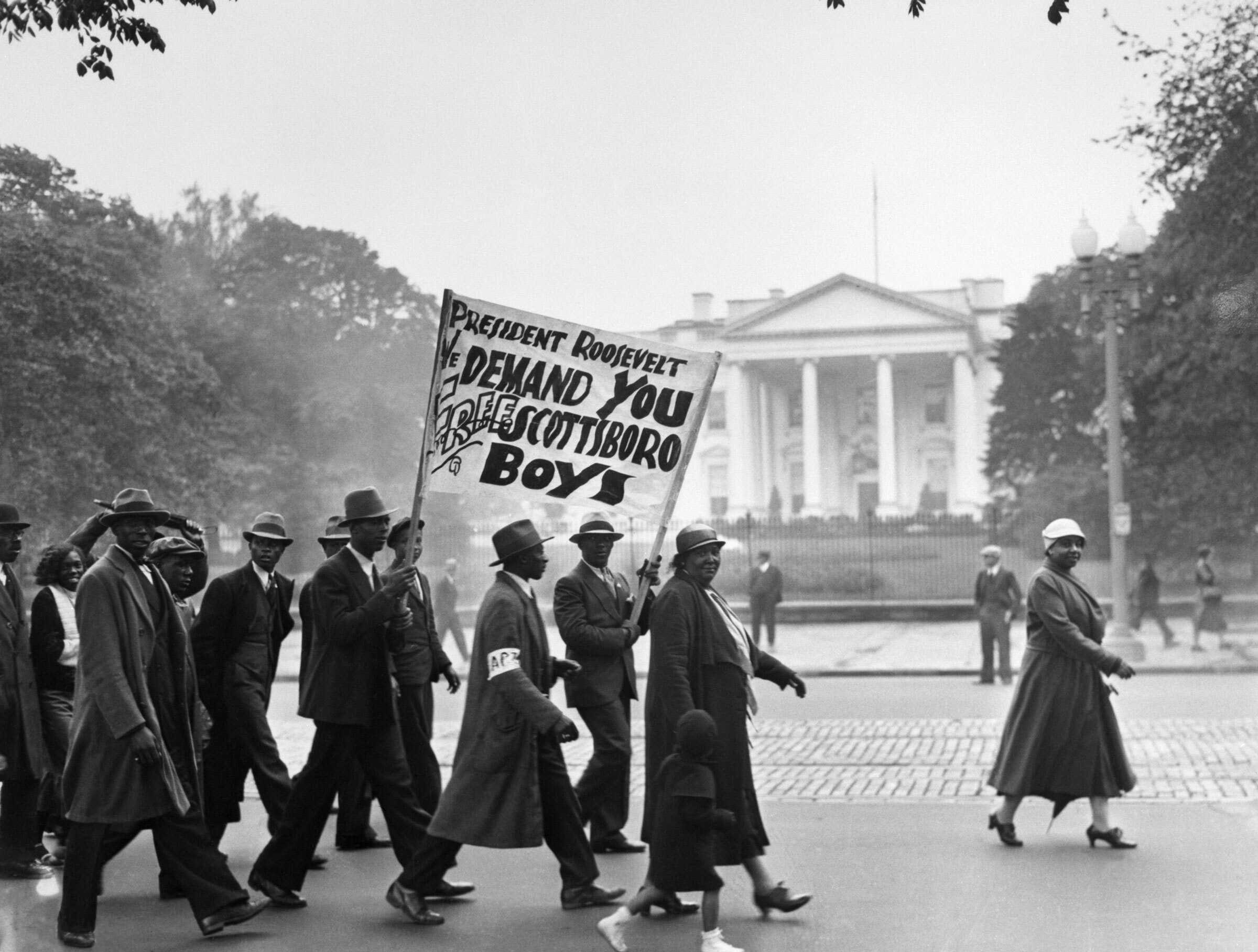Chapter 7
The Great Depression and World War II
As the United States stood on the verge of World War II, African Americans continued to suffer discrimination. Relegated to low-paying jobs and segregated conditions, they remained targets of intimidation and violence. Black sharecroppers lost their livelihoods to larger agricultural operations and modern farm machinery. Though progress was made through President Franklin Roosevelt’s New Deal, many African Americans still wanted change.
The Great Depression's Impact on African Americans
Tenant farmer near Muskogee, Oklahoma
Worker at the Tennessee Valley Authority
The economic downturn after 1929 hit African Americans particularly hard. By 1932 nearly half of all Black Americans were unemployed. Black unemployment was nearly 20 percent higher than the rate of white unemployment.
Pushed out of lower-paying jobs by white Americans desperate for work, many African Americans sought the help of public assistance programs. Many of these government programs offered African Americans fewer resources, and some charitable organizations refused to help Black families. Falling prices for cotton and other crops devastated Black sharecroppers, while federal aid to farmers went to landowners, not tenant farmers. More than two-thirds of Black sharecroppers made no profit or went into debt.
Lee County Training School in Tupelo, Mississippi,1936
Training Opportunities
Government programs in the South during the Depression offered few opportunities for African American women. Many programs, like this vocational training school in Tupelo, Mississippi, were segregated.
The Scottsboro Boys
The Scottsboro Boys
In 1931, nine African American teenagers were falsely accused of raping two white women on a train near Scottsboro, Alabama. An all-white jury convicted eight of the teenagers and sentenced them to death. When the NAACP was slow to take up the case, the Communist Party rallied to the boys’ side.
Cases involving the Scottsboro Boys eventually reached the Supreme Court. The Court overturned the convictions, ruling that the defendants’ right to counsel had been hindered and that their juries included none of their peers, namely other African Americans. After a series of retrials and reconvictions, the Scottsboro Boys were ultimately released. They collectively served more than 100 years in prison.
The Assault on Recy Taylor
Recy Taylor
Recy Taylor, age 91
In September 1944, after an evening church service in Abbeville, Alabama, Recy Taylor was kidnapped by a group of white men. She was blindfolded, raped and beaten at gunpoint, and left by the side of the road. She reported her attack to the local sheriff, who was slow to respond. The Alabama NAACP sent one of its best staff members, Rosa Parks, to seek justice for Taylor, but no one was tried for the assault. Two all-white male juries refused to indict the accused.
Taylor’s case gained national attention. The NAACP and other civil rights groups created the Committee for Equal Justice for Mrs. Recy Taylor to keep pressure on local officials.
I was an honest person and living right. They shouldn't have did that. I never give them no reason to do it.
Recy Taylor
The Tuskegee Syphilis Experiment
Meeting with medical personnel
Researchers collecting data from local residents
In 1932, the federal Public Health Service, in collaboration with Tuskegee Institute, began a study on the effects of syphilis in African Americans. The two institutions studied 600 men, 399 of whom had syphilis. The subjects received free medical exams, free meals, and burial insurance, but nothing to treat their disease. Originally planned to last for six months, the experiment went on for 40 years.
Researchers told the men that their tests and treatment were for “bad blood." This was a term used by the local community to describe a variety of ailments including anemia and syphilis. Though doctors knew penicillin could treat syphilis, it was not provided. Finally, in 1972 a whistleblower leaked the story to the press.
The mistreatment of the men in the Tuskegee experiment led to the creation of government guidelines for testing human subjects.
Black Churches Support Their Communities
Spruce Street Baptist Church
Spruce Street Baptist Church Deacon Chair
During the Depression, Spruce Street Baptist and many other Black churches provided food, clothing, shelter, and programs to help those in need. In Nashville and around the country, leaders of Black churches understood that, along with spiritual uplift, there was a great need for material support within their communities.
Father Divine and the Peace Mission Movement
Father Divine
Father Divine, a charismatic African American spiritual leader, founded his Peace Missions in Harlem and around the country during the Depression. The Missions provided jobs, food, clothing, and shelter for his followers. Father Divine was a captivating speaker who offered a philosophy of racial equality and, in his words, “heaven here on earth.” His ideals were embodied in his “Righteous Government Platform,” which called for an end to segregation, lynching, and capital punishment. His economic success during the Depression enhanced his reputation and attracted more followers.
